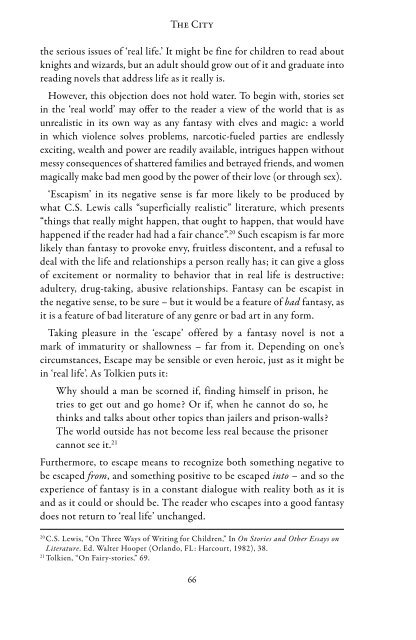THE CITY
h6c7p5d
h6c7p5d
You also want an ePaper? Increase the reach of your titles
YUMPU automatically turns print PDFs into web optimized ePapers that Google loves.
The City<br />
the serious issues of ‘real life.’ It might be fine for children to read about<br />
knights and wizards, but an adult should grow out of it and graduate into<br />
reading novels that address life as it really is.<br />
However, this objection does not hold water. To begin with, stories set<br />
in the ‘real world’ may offer to the reader a view of the world that is as<br />
unrealistic in its own way as any fantasy with elves and magic: a world<br />
in which violence solves problems, narcotic-fueled parties are endlessly<br />
exciting, wealth and power are readily available, intrigues happen without<br />
messy consequences of shattered families and betrayed friends, and women<br />
magically make bad men good by the power of their love (or through sex).<br />
‘Escapism’ in its negative sense is far more likely to be produced by<br />
what C.S. Lewis calls “superficially realistic” literature, which presents<br />
“things that really might happen, that ought to happen, that would have<br />
happened if the reader had had a fair chance”. 20 Such escapism is far more<br />
likely than fantasy to provoke envy, fruitless discontent, and a refusal to<br />
deal with the life and relationships a person really has; it can give a gloss<br />
of excitement or normality to behavior that in real life is destructive:<br />
adultery, drug-taking, abusive relationships. Fantasy can be escapist in<br />
the negative sense, to be sure – but it would be a feature of bad fantasy, as<br />
it is a feature of bad literature of any genre or bad art in any form.<br />
Taking pleasure in the ‘escape’ offered by a fantasy novel is not a<br />
mark of immaturity or shallowness – far from it. Depending on one’s<br />
circumstances, Escape may be sensible or even heroic, just as it might be<br />
in ‘real life’. As Tolkien puts it:<br />
Why should a man be scorned if, finding himself in prison, he<br />
tries to get out and go home? Or if, when he cannot do so, he<br />
thinks and talks about other topics than jailers and prison-walls?<br />
The world outside has not become less real because the prisoner<br />
cannot see it. 21<br />
Furthermore, to escape means to recognize both something negative to<br />
be escaped from, and something positive to be escaped into – and so the<br />
experience of fantasy is in a constant dialogue with reality both as it is<br />
and as it could or should be. The reader who escapes into a good fantasy<br />
does not return to ‘real life’ unchanged.<br />
20<br />
C.S. Lewis, “On Three Ways of Writing for Children,” In On Stories and Other Essays on<br />
Literature. Ed. Walter Hooper (Orlando, FL: Harcourt, 1982), 38.<br />
21<br />
Tolkien, “On Fairy-stories,” 69.<br />
66


